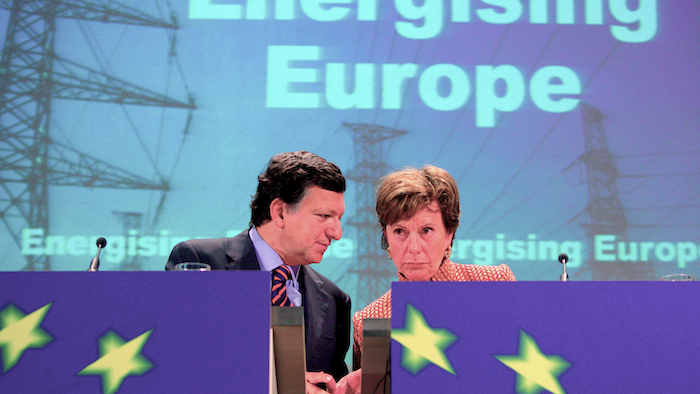José Manuel Barroso at Goldman Sachs, Nelly Kroes at Uber’s “Public Policy Advisory Board” (sic.).... These two incidences of headhunting at the very top of the European Union are certainly spectacular. But it would be wrong to see them as simple one-off deviations from the norm, linked respectively to his ideological stance (neoconservative) and her professional orientation (routinely switching between political office and the boards of large corporations). They in fact reveal the ordinary functioning of a European policy that has been flourishing for over two decades, and which we could call the “neoliberal” revolving door.
These two “defectors” are actually doing in “private” exactly the opposite of what they were required to do in “public”, playing on “interpretations”, “exemptions” and “exceptions” to undo what they previously sought to establish: the proper functioning of European rules governing the Single Market, competition and budgetary deficit limits. This is not so far removed from the classic meaning of “revolving doors”, prevalent in 1970s France, which linked high government to industrial and financial groups in strategic sectors or close to public procurement bodies. This powerful collusive network was an extension of the State’s preeminence, appointing high authorities to coordinate France’s “mixed economy”.
This is not the case in the European Union, which has never been a “productive State”, nor an economic actor (its budget is barely worth 1% of Europe’s GDP). The EU has primarily carved out its specific form of statehood and public authority by developing a “liberal interventionism” that favours economic freedoms and “undistorted” competition. The EU has done so by presenting itself as the “chief organiser” of private markets, from DG Competition to the Court of Justice.
And this market-making state forged within EU institutions has quickly spread to European states, which have drastically remodeled their administrative structures. By establishing competition authorities and financial market regulators, they have become “regulatory” states, no longer tasked with providing an alternative economic space but with ensuring the “free” functioning of private markets. They go about this by awarding “marketing authorisations”, “sanctions” (against companies abusing a dominant market position), “prudential banking rules” (to avoid “market failure”), and so on.
This neoliberal remodelling of the state has accompanied a similar trend within the market. Big businesses quickly understood that their “market power” lay with their ability not simply to generate industrial and commercial innovations, but also to influence public-sector participation in private markets. The core ambition of their commercial strategies has become accessing all relevant “regulators” (whether parliament, the civil service, commissioners, judges, etc.). In other words, as Member States and the EU became ever deeper involved in the market, thus completing this neoliberal transformation, private actors responded by acquiring expertise and practical knowledge about the “public” sector through any possible means (creating powerful public affairs departments, hiring lobbyists, head-hunting former “regulators” etc.).
Here we see the essential paradox of the neoliberal state. It is justified as a solution to public shortsightedness and as a means to clearly separate the State from the Market. But its development has in fact encouraged an unprecedented overlap between “public” and “private”, creating a new form of “rent” that benefits professional influencers (lobbyists, corporate lawyers, etc.). The neoliberal transformation states undergo is thus less a consequence of a shrinking “public” sector than the product of a powerful movement to blur the boundaries at the point where public authorities (whether national or European) meet the market.
There are obvious political and democratic repercussions. First and foremost, we are seeing the effectiveness of public initiatives being thwarted by people who have learned to counteract their effects and restrict their scope. And the proper functioning of our democracy itself is at stake. The boundary between public and private is like no other: it determines, from the perspective of democratic principles, “the grounds of expansion of the general will itself”. Shifting the line demarcating public from private can lead to profound differences in how we discuss and enact decisions.
Can we ward off this threat to democracy by increasing “transparency” measures in public life and “preventing” conflicts of interest, as Brussels has been doing for the last decade? It is reasonable to think not. First because, in Paris or in Brussels, ethics committees created to assess the potential for senior civil servants exploiting revolving doors are for the time being internal to administrations, while their opinions are secret and merely consultative.
But most of all, policies to prevent “conflicts of interest”, which underlie all these measures, seem seriously lacking when faced with the systematic intertwining of “public” and “private”. The juridical battle against these “conflicts of interest”, largely directed against individuals, is far from enough to halt the steady growth of the “public-private” sector, and its rising influence in each new national and European law achieving the State’s neoliberalisation. If we really want to put an end to this “corrupting” of public life – where high-profile examples of revolving doors are the tip of the iceberg – we must establish a wider political account that documents the consequences and cumulative effects of two decades of neoliberal legislation.
Was this article useful? If so we are delighted!
It is freely available because we believe that the right to free and independent information is essential for democracy. But this right is not guaranteed forever, and independence comes at a cost. We need your support in order to continue publishing independent, multilingual news for all Europeans.
Discover our subscription offers and their exclusive benefits and become a member of our community now!












